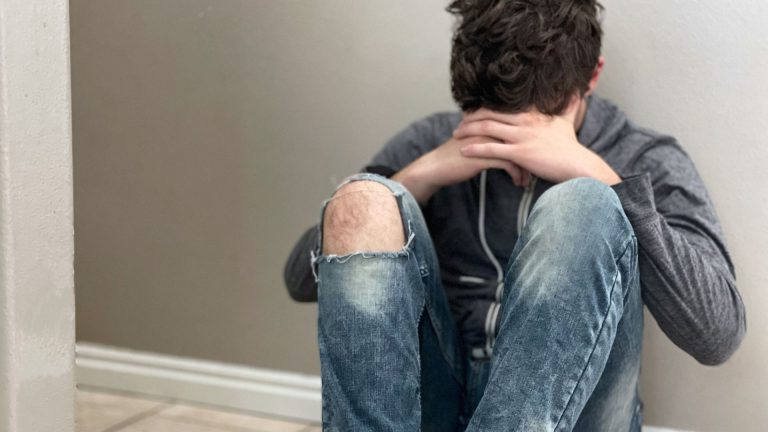Guiding You Through the Maze of Teen Mental Health

Written by Sarah Richardson, CEO of someone.health.
If you’ve ever had that gut feeling something’s not quite right with your teenager – maybe they’re more withdrawn than usual, snapping over small things, or just… not themselves – you’re not alone! Many parents report feeling uncertain or overwhelmed when their teenager shows signs of emotional distress. But support is available, and so many other parents are facing similar challenges.
Parents need to balance multiple and often conflicting responsibilities, including managing household needs and supporting their children’s wellbeing, which can become especially demanding during a child’s mental health crisis. With a maze of waitlists and referrals, it can feel like help is a long way off when your teen is struggling, and you’re doing your best to just simply hold it together.
Mental illness affects one in seven young Australians each year – that is a classroom full of teens in every school across the country trying to cope with something new, invisible and overwhelming2. Now, add in the pressures of daily life, hormones, new social experiences, schoolwork and exams. In fact, it isn’t just teens that struggle, but the adults too, with cost-of-living stress affecting the mental health of three in five Australians1.
When the adults are struggling, how can we expect our kids to be coping?
With over a quarter (26%) of young people experiencing high or very high psychological distress2 there exists a big risk to this having knock on affects negatively impacting their educational outcomes, successful transition into full-time work, a healthy lifestyle, as well as ability to experience less challenges when forming families and parenting2.
The demand and need for support is clear – yet the battle isn’t over once you decide that external advice and intervention is needed. Over 10% of GP clinics in Australia aren’t accepting new patients right now3, meaning the first hurdle before even reaching a psychologist or psychiatrist is more challenging than it ever has been.
This issue of access is exacerbated for families living in regional and rural areas due to limited services locally, appointment costs, and a general lack of awareness about where to turn for help4. These barriers, as well as general gaps in the mental health system, are making it harder for young people to receive timely care, which in turn places additional emotional and logistical strain on their parents and caregivers.

When your teen is struggling, the last thing you need is more admin, more costs, and more confusion – that is where bulk billed telehealth steps in. Not as a quick fix, but as a real, accessible pathway to support that doesn’t come with a four-month waitlist or a three-hour round trip.
For teens aged 13 and over, mental health challenges like anxiety and depression are scary, because this is such a pivotal and influential age that already has its own set of challenges. These are also the years when stigma, embarrassment, or just plain reluctance to talk to adults can stop kids from getting the support they need. This can make teens resist help and, due to their limited life experience, make it difficult for them to see the light at the end of the tunnel or be able to put what they’re going through into perspective.
Telehealth psychology platforms provide a softer introduction into the world of mental health support, particularly for those who feel more comfortable accessing support from home or who face barriers to in-person care5. By removing the need for a referral or out-of-pocket costs, bulk billed services like someone.health remove two of the biggest barriers: access and affordability.
This approach is also discreet. Teens may be reluctant to speak up if they think therapy will mean missing school, driving across town, or walking into a clinic that potentially places them and their struggles in view of their peers.
A video session on a phone or laptop feels safer. It’s low-pressure. It’s private. Surveys show that Australian teenagers use digital platforms to seek information about mental health, which can influence how they engage with support services, especially helping those suffering with anxiety5.
Additionally, bulk-billed telehealth sessions can reduce both time and financial pressures on families by removing the need for travel, upfront costs, and time away from work or school.
This isn’t about quick fixes. It’s about giving families options that actually work. It’s about recognising that while the system may be slow to change, telehealth is already proving that access to care doesn’t have to be this hard.
Parenting through a child’s mental health challenges can be incredibly difficult but taking steps to seek support is a meaningful and valuable part of helping your child that will continue to benefit them way into the future. That step is now easier: platforms like someone.health offer free, bulk-billed telehealth psychology sessions, no referral, no waitlists, just direct access to support. Asking for support isn’t failure, it’s fierce, loving action. And you’re doing better than you think.
 Written by Sarah Richardson, CEO of someone.health. someone.health is a leading provider of bulk billed psychologists in Australia, providing treatment for stress and anxiety, depression and many other mental health conditions including ADHD, autism, OCD and PTSD.
Written by Sarah Richardson, CEO of someone.health. someone.health is a leading provider of bulk billed psychologists in Australia, providing treatment for stress and anxiety, depression and many other mental health conditions including ADHD, autism, OCD and PTSD.
Citations:
- https://mhaustralia.org/sites/default/files/docs/report_to_the_nation_2023.pdf
- https://www.aihw.gov.au/reports/children-youth/health-of-young-people
- https://cleanbill.com.au/wp-content/uploads/2025/01/Cleanbill-Blue-Report-January-2025.pdf
- https://bmchealthservres.biomedcentral.com/articles/10.1186/s12913-023-10034-4#:~:text=Moreover%2C%20financial%20costs%2C%20disadvantage%2C,areas%20of%20Australia%20%5B2%5D.
- https://www.mentalhealthcommission.gov.au/sites/default/files/2024-03/return-on-investment-prevention-in-mental-health-e-health-interventions-for-the-prevention-of-anxiety-disorders-in-young-people.pdf#:~:text=Young%20people%20in%20Australia%20are%20frequent%20users,search%20for%20mental%20health%20information%20online%20(6)






















